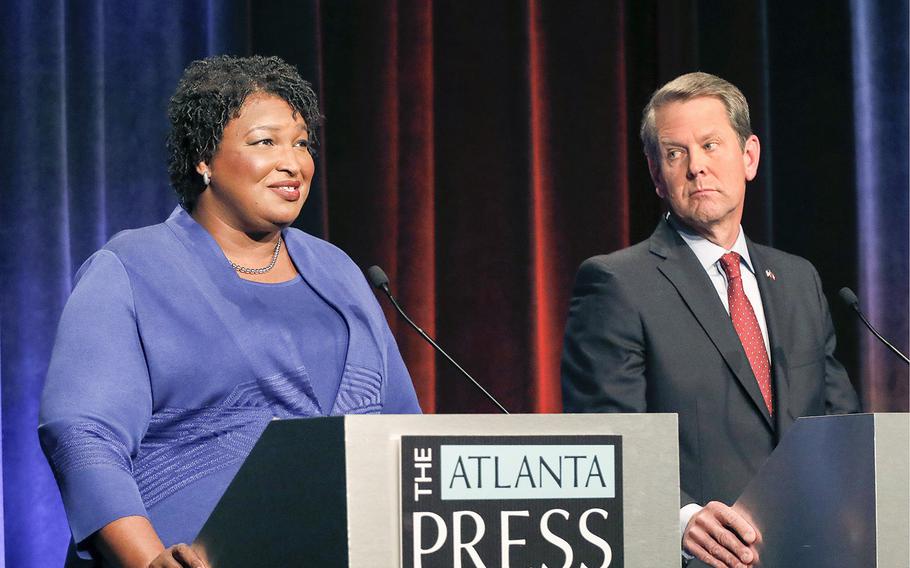
Then-Democratic gubernatorial candidate for Georgia Stacey Abrams, left, speaks as her Republican opponent Secretary of State Brian Kemp looks on during a debate in Atlanta on Oct. 23, 2018. A federal judge ruled on Friday, Sept. 30, 2022, ruled against Abrams’ lawsuit against Georgia’s election laws. (John Bazemore/Pool/AP)
ATLANTA — A federal judge upheld Georgia's election laws in a ruling issued Friday evening in a blow to Fair Fight Action, the voting rights group founded by Stacey Abrams, who also is the state's Democratic gubernatorial nominee.
Abrams's group filed a lawsuit against Georgia's secretary of state soon after her 2018 election defeat, arguing that Georgia's absentee ballot policies - which require an "exact match" for names and addresses between voters' IDs and voter registration records - represented "gross mismanagement" of the state's election systems that violated Georgia voters' constitutional rights.
A federal judge ruled in favor of the state, however, saying that the law was valid and that the "burden on voters is relatively low."
"Although Georgia's election system is not perfect, the challenged practices violate neither the constitution nor the [Voting Rights Act]," U.S. District Judge Steve C. Jones wrote in his decision.
"The Court finds that plaintiffs have failed to prove that the burdens imposed by [exact match] outweigh the State's interests in preventing fraud," Jones, an appointee of President Barack Obama's, wrote in his decision.
Georgia's "exact match" system placed nearly 50,000 Georgians' voter registrations on hold before the 2018 election. Abrams's group argued that the law was racially discriminatory because 70 percent of those whose registrations were suspended were Black.
The case, Fair Fight Action, Inc. v. Raffensperger, challenged a range of issues including the difficulties that naturalized U.S. citizens faced in voting as a result delayed updates in the state's records. The suit also argued that poll workers received improper or incomplete training about how to cancel the absentee ballots of voters who say they never received them. That led to confusion and frustration at many polling sites in 2018.
The plaintiffs cited other problems with the law including the registration process for those with felony convictions; the state's system for merging records; and the process of removing from voter rolls the names of those who had died.
Jones ruled that Fair Fight had not provided "direct evidence of a voter who was unable to vote, experienced longer wait times, was confused about voter registration status by being in [exact match] status, or experienced heightened scrutiny at the polls due to [exact match]" policies.
He added that the state's justifications for its use of several practices raised in the lawsuit "outweigh any potential burdens on voters."
After the decision was issued, Georgia Secretary of State Brad Raffensperger (R) called the claims raised in the lawsuit "nothing but poll-tested rhetoric not supported by facts and evidence."
Several of the policies - including "exact match" - raised in the lawsuit, have been largely abandoned since the 2018 gubernatorial race. Georgia's election rules also have been overhauled several times since the lawsuit was filed, most notably in a sweeping 2021 election law that tightened voter ID requirements; added restrictions on requesting mail-in ballots; limited the use of drop boxes; and expanded the power of state lawmakers over local election policy.
The decision comes five weeks before Abrams's rematch against Gov. Brian Kemp (R), who oversaw the state's elections in 2018 as secretary of state and won the race by nearly 55,000 votes.
"From day one, Abrams has used this lawsuit to line her pockets, sow distrust in our democratic institutions, and build her own celebrity," Kemp said in a statement on the decision. "Judge Jones' ruling exposes this legal effort for what it really is: a tool wielded by a politician hoping to wrongfully weaponize the legal system to further her own political goals."
Abrams criticized the court's 288-page ruling, saying that it "explicitly lays out the hazards of a system rife with barriers that disproportionately impacted Black and Brown people."
"Imperfection is no excuse for the discriminatory practices Georgians saw from the Secretary of State's office in the 2018 elections," she said in a statement on Friday.
Fair Fight Executive Director Cianti Stewart-Reid said the decision was "no doubt a significant loss for the voting rights community in Georgia and across the country" but promised that Fair Fight would continue programs to register and educate voters on the election process.
"Litigation is only one tool to fight against voter suppression," Stewart-Reid said.